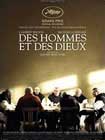
|
Of Gods and Men review
:. Director: Xavier Beauvois
:. Starring: Lambert Wilson, Michael Lonsdale
:. Running Time: 2:00
:. Year: 2010
:. Country: France
|
It is often said that the first scene (s), as the last, may be sufficient to indicate the presence, in front of our eyes, of a masterpiece (one example: Apocalypse Now) or a complete flop (endless examples each week in theaters). In between these extremes, there is the first scene of Of Gods and Men, by Xavier Beauvois. A corridor filmed from the front in the dark; silhouettes enter the frame and head towards the end to disappear behind a door. At the end of the film, these same figures sink, not toward the end of the corridor, but into a snowy mist, always silently. A silence made for contemplation, but also dead silence. The metaphor is simple: the corridor of death, that is to say the whole film, leading to the execution, filmed with modesty, behind the veil of mist that symbolizes the mystery still hovering around this massacre. Between these two shots is a film in which hangs the shadow of death foretold by its opening scene.
The massacre mentioned here is that of the Cistercian monks of Tibhirine, in Algeria, committed in 1996 at the height of the confrontation between the State and the extremist terrorist groups, which inspired the film. Beauvois uses context in the service of his argument, favoring a gray-tinted photography, filming a bright and sunny country such as Algeria as he would film a world in ashes, victim of obscurantism.
He creates his frames with the precision of the monks' rituals. As the seasons progress, to the slow rhythm of liturgical chant, the film adopts the diction of the Psalms, whether to stage the work of daily life, relations with the villagers or confrontations with the army and Islamic extremists. More than a film about faith, it is primarily a questioning of the moral position that the characters must take. To leave or to stay? Face the danger, welcome and accept death, sacrifice oneself, go through with one's convictions at the price of one's own life, or abandon the village and hence even oneself? So many questions that each monk asks himself individually, but also as the overall community they form together. A beautiful film, in the aesthetic sense of the word, where each element is in place, makes sense. This control, unfortunately, is the main flaw of what quickly becomes a movie made by a student, rather than a master. In each scene you can read the director's intentions, his approach almost overflowing beyond the frame, and aims to be too obvious. By constantly trying to adapt the film's envelope to its theme, the audience ends up being two or three steps ahead of the story. This way of explaining everything adds to the failure of the film, and we leave with a feeling of disappointment: the certainty of having seen a beautiful exercise in style, but which prevents any sort of emotion to surface. Pity.
Moland Fengkov
Translated into English by Christina Azarnia

 French Films: 2012+ & current Reviews French Films: 2012+ & current Reviews
 French Films: 1998 - 2011 Reviews French Films: 1998 - 2011 Reviews
 French Music Reviews French Music Reviews
|
|


